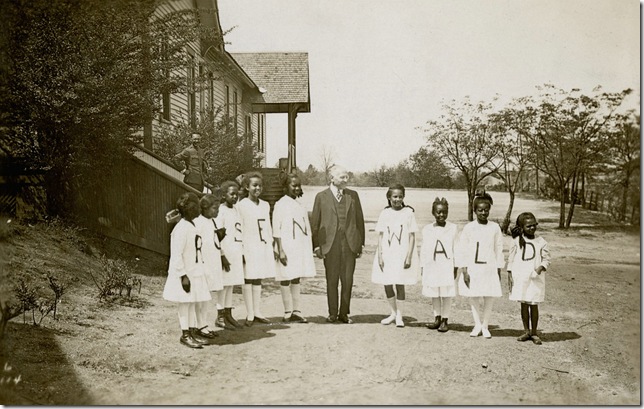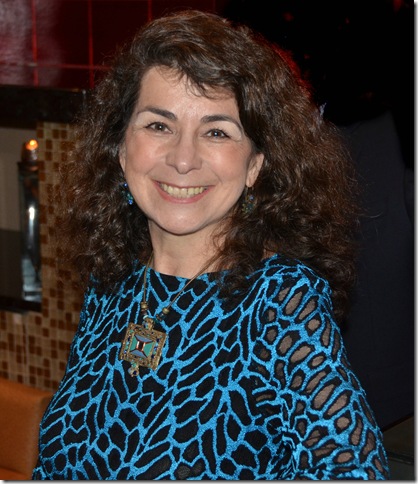Julius Rosenwald.
Do not feel bad if you cannot identify the name. Filmmaker Aviva Kempner, who focuses on the Chicago retail mogul and philanthropist who donated over $62 million to benefit African-Americans throughout the South, estimates that eight out of 10 people who see Rosenwald know little about the man who is its subject.
“I think it’s the most inspiring story of philanthropy,” says Kempner, 68. “Julius Rosenwald built schools that educated at least 600,000 African-Americans in the last century. Yet it’s a total unknown story of how one man — with his vision and with Booker T. Washington — could educate a whole population essentially out of poverty, to not just be working the fields. And he also gave to great artisans like Marian Anderson and Jacob Lawrence, and scholars like John Hope Franklin and Ralph Bunce.”
Rosenwald the film follows in the tradition of Kempner’s body of work, shining a light on such prominent, ground-breaking Jews as baseball player Hank Greenberg and television pioneer Gertrude Berg.
“Underknown Jewish heroes is how I put it,” she says. “With Hank Greenberg, it was someone who faced anti-Semitism but really excelled to defy that kind of pressure. Gertrude Berg defied sexism in her industry. And she also faced McCarthyism with great courage.
“With Julius Rosenwald, I guess it’s another ism again,” racism. “Someone who saw that under Jim Crow, African-American children in the South really needed a chance.”
The son of an immigrant peddler, Rosenwald rose to become CEO of Sears, the retailing giant that Kempner calls “Amazon way before there was Amazon.” Born in 1862, Rosenwald saw the social inequity in the way blacks were treated and he underwrote the building of some 5,400 schools for them, as well as housing and YMCAs for the African-American community.
Yet as recently as 2003, Kempner too was unfamiliar with Rosenwald.
“Twelve years ago I was on Martha’s Vineyard and I went to a lecture at the Hebrew Center called ‘Blacks and Jews’ because Julian Bond, one of the civil rights intellectuals and activists, was speaking and also Rabbi David Saperstein. I thought I was going to a talk about the civil rights era. Little did I know it would be about a period way before.
“(Rosenwald) really is a groundbreaker in philanthropy. There are just so many lessons for today in how much he got the community involved,” says Kempner. “The minute Julian started talking how his father and his uncle were helped by Julius Rosenwald, a light bulb went on over my head.” She knew what the subject of her next film must be.
Over the years it took to make Rosenwald — delayed mainly by her fund-raising needs — Kempner got to know Bond, who passed away last month, just days after the film arrived in theaters. “I had become such close friends with him and his wife,” she says. “Just before he died, he was getting some X-rays and he told his X-ray technician, ‘Now make sure you see this film on Rosenwald.’ He had advised me all along the way and there are great interviews with him. I miss him dearly.”
In addition to Bond, the film includes tributes to Rosenwald from civil rights leaders Ben Jealous and U.S. Rep. John Lewis, columnists Eugene Robinson and Clarence Page, and such Rosenwald school alumni as writer Maya Angelou and director George C. Wolfe. In an attempt to evoke the period in which Rosenwald lived, the film includes brief clips from such movies as Dr. Quinn Medicine Woman, A Raisin in the Sun, The Frisco Kid, The Music Man and Rosewood.
Many of them Kempner was able to obtain inexpensively. “I had met (CBS president) Les Moonves at a reception for ‘Face the Nation’ and he was a big fan of (her film) ‘Hank Greenberg.’ So his legal office at CBS gave me for free the clips I wanted. A lot of people were very, very nice,” she says. But she wanted to use Louis Armstrong’s rendition of What a Wonderful World and his estate wanted $75,000 for its use – way over Kempner’s budget.
So why did Rosenwald devote such vast amounts of money to impoverished blacks? “First of all, he grew up across the street from Abraham Lincoln’s house and he sort of took on the legacy of Lincoln,” explains Kempner. “Also, his rabbi, who he really respected and whose sermons he went to whenever he was in town, would preach about repairing the world. I think when he read [Booker T. Washington’s] ‘Up from Slavery,’ he was really moved, feeling, ‘I can make a difference.’ Like Maya Angelou says in the film, ‘He likened the pogroms to the lynchings that he saw.’ He stepped up to the plate to do something that really needed to be done.”
In addition to telling moviegoers about this remarkable man. Kempner hopes that her film will prompt them to acts of philanthropy on whatever level they can afford. “Especially in Palm Beach, there are a lot of people with wealth, and I think it’s a very inspiring story of philanthropy. Anyone who reads your article could be inspired to give.”
Rosenwald is now showing at Shadowood 16, the Living Room Theatres at FAU, Movies of Delray, Movies of Lake Worth, and Lake Worth Playhouse.

